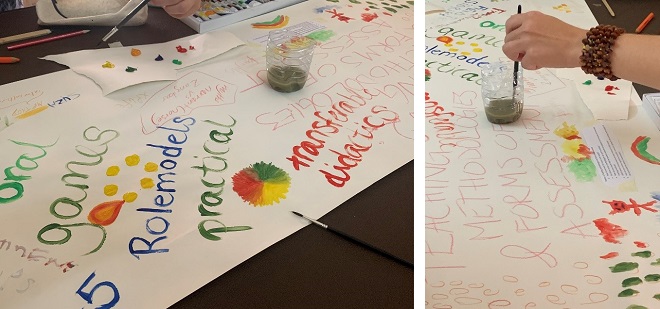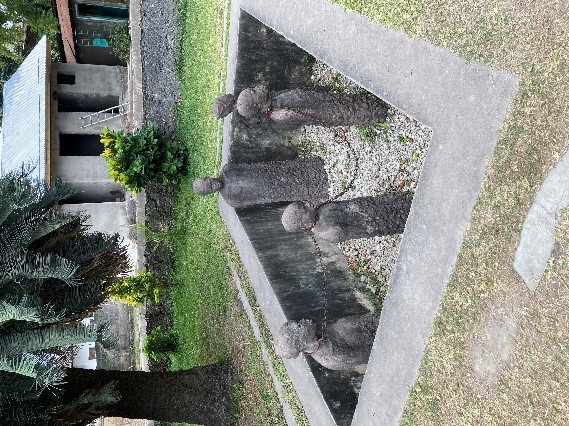In the busy streets of Zanzibar, people are huzzling by with their chickens, brooms and carts of cashew nuts.
The old city smells of soaps, insence and blends of spice.
Cloves are put out to dry.
The kangas worn by the women have vibrant colors
and the children laugh while hiding in their mother’s skirts.
A couple of weeks in Zanzibar is not the worst way to start the semester. Andrew Thomas, Ragnhild Næsje and Gunhild Brænne Bjørnstad (project coordinator) were the lucky beneficiaries of the collaboration Østfold University College has with State University of Zanzibar. As part of the project NoZa – intercultural mobility project, the aim of their stay was to strengthen the multicultural focus in teacher education in both institutions, together with the Zanzibari team consisting of Dr. Maryam Jaffar (local coordinator), Dr. Said Juma (Dean of School of Education), Ms. Mwanamrisho Gora (Head of department of teacher education) and Mr. Abrahman Babu (PhD). Our last team member Hilde Fjeld (HiØ) was unfortunately not able to join the trip due to unforeseen circumstances and was dearly missed.
Developing a joint course
The project received funding from DIKU - Norwegian Agency for International Cooperation and Quality Enhancement in Higher Education in 2019. The intention was to kickstart in March 2020, but due to the outbreak of Covid-19 the first physical project meeting had to be postponed. Eagerly awaiting the pandemic to ease off, Gunhild Brænne Bjørnstad exclaimed:
- Finally we were able to get together, sharing ideas and practices, learning about each others teaching cultures and institutions. This has been such a great experience!

The main task of the group was to develop and design a joint course that will include students from Norway and Zanzibar, on the topics of Learning together – education for multicultural democracies. The course will mainly be offered at the campus in Zanzibar, but with lecturers from both institutions. The module will also include experiences from Zanzibari classrooms for the Norwegian students, and Zanzibari students will be offered scholarships to come to Norway to get similar classroom experiences. The course is still under construction, but the goal is to offer it already in the spring term 2023. - I am surprised at how alike we think about education, Andrew Thomas expressed, and was joined by Abrahman Babu, a Zanzibari colleague: - Yes, I agree! The contexts differ, but the topics are still relevant in both countries. That’s what meakes this course so exciting!
Historical and cultural frame

Zanzibar is a group of islands situated outside Tanzania in East Africa. The Unesco-protected historic city of Stonetown, offers a great number of sites worth visiting, ranging from the Freddy Mercury museum to the old Slave Market. The history of the slave trade is still very evident in Stonetown and the whole island of Unguja. Being an important port between the African continent and the Indian and Arab empires, Zanzibar has been vastly influenced by these cultures. The population is mainly muslim, and you will find Indian and Arab carved doors all around the city. Lately, migration and tourism has had huge cultural and economic impacts, allowing Zanzibar to become a much praised holiday destination. But the cultural and historic frames offer a much deeper understanding of the Zanzibari life.
Mutual exchange
The project aims for a balanced and nuanced collaboration between the institutions. The equality between the project participants is essential to how the project is driven forward. Finding topics and research areas that both institutions are engaged in is regarded a key factor for a successful collaboration. As a means to ensure that students at both institutions gain from the project, Zanzibari students are given scholarships to exchange to Norway for five months, taking modules in the course Nordic Citizenship Education at Østfold University College.
In January 2022, the project welcomed the first three students from Zanzibar to Halden. Coming from the sunny beaches of Zanzibar with approximately 40°C to snowy, winter-Norway with -20°C was a bit of a shock. But after staying for five months in Remmen, Aisha Rashid, Zuwena Abdallah and Enock Mathias had not only grown accustomed to the weather, but also the way of life and thought in Norway. As future teachers such experiences adds value to their profession in terms of curiousness and nuanced respect for other people. Their stay also provided the project with valuable experiences on the administrative side.
Sharing practices
As a way to better understand and discuss pedagogical and didactic practices and challenges, the NoZa project includes workshops where the participants share their best teaching methods with each other, but also invite local teachers to attend. In Zanzibar, academic staff members Maryam Amour and Aziza demonstrated methods like Circus and TaRL (Teaching at the Right Level), while Ragnhild Næsje shared her rich methods for storytelling and early language learning. Visiting local kindergartens and schools also introduced interesting perspectives to the discussions, and thoughts on potentials for joint research.

What does the future bring?
This being the first NoZa project meeting, the ambitions of the project are certainly growing bigger. The impact of meeting face to face, and in such an inspiring setting, sets off a number of ideas for expansions and future projects. But first of all the project aims to launch the joint course, and welcome more students to exchange. During the spring 2023, a new project meeting will be taking place in Halden, to work further on ideas for joint research and potential new projects. - We are just getting started! says coordinator Gunhild Brænne Bjørnstad excited.

Dunia ni maarifa,
the world is knowledge
